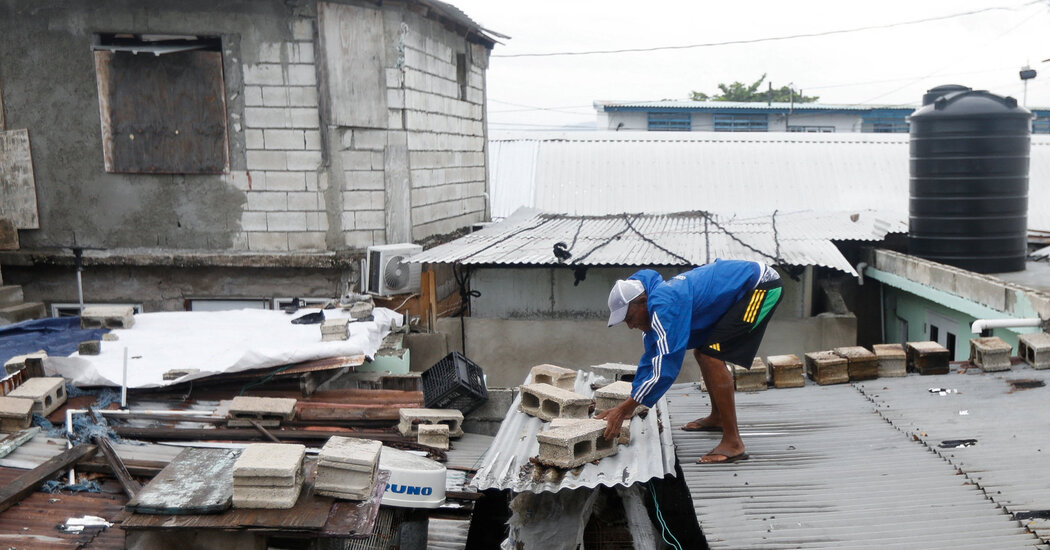It has become a tired adage, but nonetheless true. The world’s poorest countries will suffer the most from climate change despite being least responsible for it.
Leaders in the Caribbean and from vulnerable island states around the world have been repeating this for years. And they have been asking the world’s rich countries, whose greenhouse gas emissions over generations have fueled warmer seas and bigger storms, to help them prepare.
With Hurricane Melissa scouring Jamaica with vicious intensity before setting its sights on Cuba and the Bahamas, it is likely that many of the affected countries will once again be overwhelmed by the expense of recovery. The Caribbean is the world’s most exposed region to climate-fueled disasters, according to the International Monetary Fund, which has said the region requires about $100 billion in economic investment to build resilience.
In one of his first acts upon entering the White House, President Trump stopped the United States from contributing funding to help vulnerable countries prepare for the threats from global warming. Since then, the administration has dismantled virtually all of the foreign aid programs and offices that work with poor countries and others struggling to cope with disasters.
“Our countries don’t have the luxury to become more resilient to climate change,” said Michai Robertson, a senior adviser to the Alliance of Small Island States, who is from the Caribbean nation of Antigua and Barbuda. Infrastructure on Barbuda was decimated by Hurricane Irma in 2017, a storm that caused more than $77 billion in damages across the Caribbean and South Florida.
“If people are facing the choice between getting shutters for your home versus getting food on the table, the obvious, humane choice is the latter,” Mr. Robertson said “But the reality is that it all could be wiped out. That’s the gravity of the situation.”
A nightmarish scenario is unfolding in Jamaica, where predicted rainfall from the hurricane is being measured in feet, not inches. Melissa is already sure to be one of the most powerful storms on record, and forecasters have warned that wind speeds are high enough in its eyewall that they could cause “total structural failure” and widespread power and communication outages.
On Tuesday morning, as the storm bore down, Mr. Robertson said his brother and grandparents were in Jamaica. Everyone in his family was on edge and nervously checking their phones, he said.
“In moments like this it really hits home that there’s this void and lack of leadership,” he said. “Not only are wealthy countries retreating from fighting climate change, they’re not listening to us.”
Hurricanes have inflicted tens of billions of dollars of damage on Caribbean nations in recent years, leaving most heavily in debt. Jamaica, the Bahamas, Barbados, and Antigua and Barbuda, all recently hit by major hurricanes, have debts that are nearly equal in size to their entire economies.
Mia Mottley, the prime minister of Barbados, has emerged as a leading global voice on securing financial solutions to the disaster and debt spiral affecting small island states. She has rallied leaders of larger and richer nations to support reforms at the world’s largest lending institutions like the World Bank and International Monetary Fund such as suspending debt repayments while poorer nations recover from disasters.
The Inter-American Development Bank has found that, in the aftermath of severe storms, debt levels in Caribbean countries are 18 percent higher than what would otherwise be expected.
Potentially complicating recovery efforts, many island nations are reliant on fossil fuels that are imported by sea. Jamaica generates more than 85 percent of its electricity from liquefied natural gas and crude oil imports, and it depends on a single state-owned refinery nestled on the Kingston Harbor shoreline. Damage to that facility alone could severely hinder any local rescue and recovery efforts.
In recent days, Jamaica’s energy minister, Daryl Vaz, has said the refinery, Petrojam, has been working around the clock to stockpile fuel. “We’ve activated all refinery emergency systems, and confirmed sufficient fuel supplies, over two weeks’ worth,” he said.
In just a week from now, negotiators from around the world will converge in Brazil for the United Nations’ annual climate summit. The global talks, known by the acronym COP, have been increasingly dominated by the question of money. The United Nations has issued studies showing that developing countries need more than one trillion dollars per year to both transition their economies away from polluting fossil fuels that drive climate change, and to adapt to the changes already underway.
At last year’s talks, wealthy countries ultimately agreed to contribute $300 billion per year toward those goals, though much of it was expected to be in the form of loans. Only a small fraction of that money was specifically geared toward disaster preparation and recovery.
In 2021, wealthy countries agreed to double the amount they give for adaptation over the next four years, which would amount to at least $40 billion annually by 2025. All signs point to them falling well short of that pledge.
The Biden administration had sought to deliver roughly $3.1 billion in climate adaptation aid for 2023. But Mr. Trump, who has called climate change a hoax, rescinded those funds and stopped other efforts to help nations cope with the effects of global warming.
Lisa Friedman and Hiroko Tabuchi contributed reporting.
Max Bearak is a Times reporter who writes about global energy and climate policies and new approaches to reducing greenhouse gas emissions.
The post For Years, Islands Have Warned of Climate Disaster. They’ve Seen Little Help. appeared first on New York Times.




